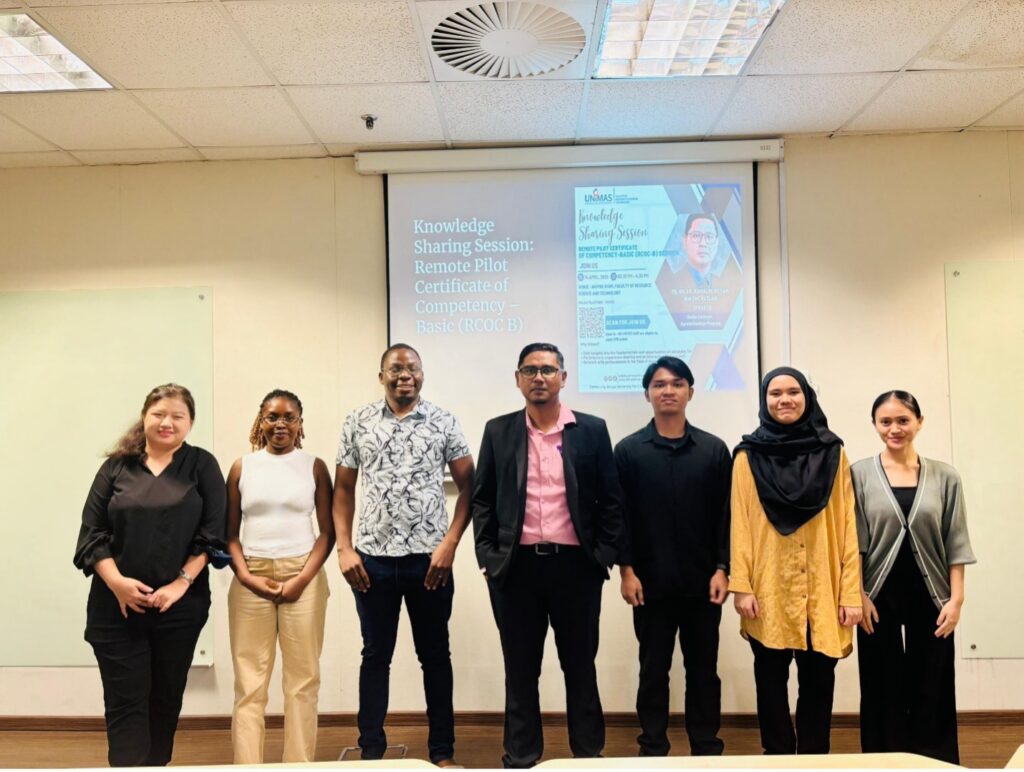
Dr. Kamalul and participants posed for a group photo after an engaging session on drone competency and certification, which was joined by 130 participants both online and on-site.
On 14 April 2025, the Faculty of Resource Science and Technology (FRST) at Universiti Malaysia Sarawak (UNIMAS) conducted a Knowledge-Sharing Session on the Remote Pilot Certificate of Competency – Basic (RCOC-B) in the Inspire Room, FRST. This initiative demonstrated UNIMAS’s dedication to promoting awareness of drone technology and enhancing competency within its academic community.
Exploring the Skies: RCOC-B Awareness Session at FRST UNIMAS
The session was conducted by Ts. Gs. Dr. Kamalul Adham Bin Che Ruzlan, a Senior Lecturer in the Agrotechnology Program. Drawing on his expertise in precision agriculture and UAV applications, he delivered a comprehensive overview of the RCOC-B certification, outlining essential aspects like regulatory frameworks, operational procedures, and career opportunities in UAV piloting within Malaysia.
The event was conducted in a hybrid format, allowing participants to attend either onsite or online through WEBEX. It drew staff and students from various faculties, particularly those focused on using drone technology within agriculture, surveying, environmental science, and research.

Why the RCOC-B Certification Matters
The session aimed to clarify drone operation fundamentals and compliance with CAAM regulations. It featured personal insights from a certified remote pilot instructor, addressing both the challenges and opportunities within the industry. Additionally, it fostered interactive discussions and networking, bridging academic knowledge with practical UAV industry applications.
By the end of the session, participants gained practical guidance on obtaining the RCOC-B license, covering essential knowledge areas and highlighting the advantages of certification for professional and research growth.
Driving Technological Competency at UNIMAS
This knowledge-sharing initiative aligns with FRST’s strategic objective of incorporating industry-relevant skills and emerging technologies into its academic and professional development frameworks. Attendees departed from the session with a clearer understanding of the certification’s significance and how it supports their academic, research, and career goals.

Expanding Future Opportunities
This initiative bolsters UNIMAS’s commitment to enhancing research and innovation via emerging technologies. Alongside the knowledge-sharing session, Ts. Gs. Dr. Kamalul Adham revealed opportunities for open collaboration, research partnerships, and training programs aimed at UNIMAS staff and students. These efforts focus on investigating wider applications of drone technology, especially in areas like mapping, photography, and precision agriculture.
Through these partnerships, UNIMAS aims to enhance its role in innovative drone research while providing students and researchers greater access to practical, industry-related UAV technologies. UNIMAS was grateful to all attendees and promotes ongoing involvement in similar activities that align with the university’s vision as a Community-Driven University for a Sustainable World.

During the RCOC-B sharing session, Dr. Kamalul demonstrated how to navigate a drone and highlighted essential drone components using a model.
This project, conducted at FGV, led by Dr. Kamalul, focused on integrating UAV technology into smart farming practices, aiming to enhance efficiency, accuracy, and sustainability in agricultural management.


The findings from the project showed that improving drone spraying efficiency enhances precision agriculture for large plantations.
This article was prepared by Ts. Gs. Dr. Kamalul Adham and Dr. Dency Flenny Gawin